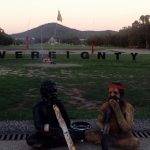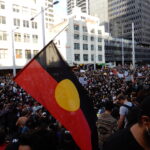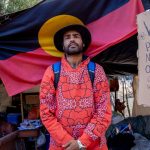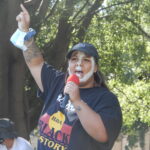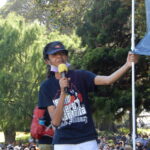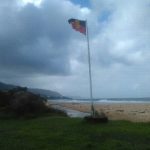“All Roads Lead to the Aboriginal Tent Embassy”: Gwenda Stanley on the 50th Anniversary
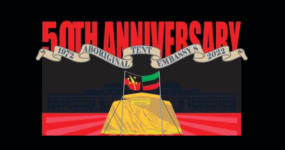
The 26th of January marks 50 years since the Aboriginal Tent Embassy was established on the lawns out the front of the building today known as Old Parliament House.
Situated in Canberra, the Embassy operates upon Ngambri-Ngunnawal Country.
The Tent Embassy will be marking its half century with a three-day event commencing on the 25th, which, it’s outlined in a recent statement, will involve honouring and mourning the past, celebrating survival, and strategising for the next fifty years to come.
The diplomatic voice of the Aboriginal Tent Embassy is its pivotal role. It supports grassroots nonviolent actions and assists Aboriginal and Torres Strait Islander peoples with government business.
Indeed, activists from the Tent Embassy played a key part in seeing genocide recognised as an official criminal offence in Australian law, as, prior to 2002, it wasn’t a statutory crime, despite the role genocide played in the establishment of Australia.
First Nations land rights
On 25 January 1972, then Australian prime minister Billy McMahon released a statement outlining his government would not recognise First Nations land rights, but rather he’d be setting up a system whereby Aboriginal people would be able to apply for 50 year leases covering their own lands.
That night a number of Black Power movement activists met in Sydney, and it was decided from there to dispatch four young men – Billy Craigie, Tony Coorie, Michael Anderson, and Bertie Williams – down to Canberra to establish the Aboriginal Tent Embassy.
Gumbaynggirr elder Professor Gary Foley has described the Aboriginal Tent Embassy as “the most significant and successful Aboriginal political action of the entire 20th century”.
In his 2001 article Black Power in Redfern 1968–1972, Foley notes the Embassy’s symbolism conveys the situation where First Nations peoples have been relegated to aliens on their own land.
Aboriginal people travelled from across the continent to join the unprecedented action, which rejected McMahon’s lease system.
Gough Whitlam later acknowledged that the Embassy played a key role in seeing him elected as PM in November 1972, ending 22 years of conservative rule.
“A political voice for our people”
Long-term activist Gomeroi woman Gwenda Stanley is currently at the Aboriginal Tent Embassy assisting with the preparations for the 50th anniversary event. And she explains that all are welcome to join – “to come down, listen and share”.
As for the recent disruptions at Old Parliament House, the Embassy was not involved.
Wiradjuri and Badu Island Yinaa from Erambie, Lynda-June Coe has provided a detailed explanation of the Embassy’s position in relation to these incidents in her recent article Leaders of Aboriginal Tent Embassy Denounce Fire at Old Parliament House published in IndigenousX.
Sydney Criminal Lawyers spoke to Gwenda Stanley about the significance of the half decade anniversary, the effect that the 40th anniversary Embassy mandate has had over the last ten years and the path forward for the First Peoples of this continent.
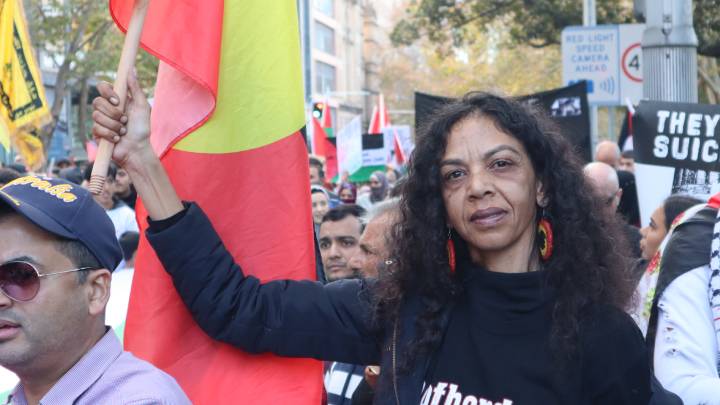
In two weeks, it’s the 50th anniversary of the Aboriginal Tent Embassy in Canberra. Gwenda, how would you sum up the significance of its half century?
It was always about land rights. And we still haven’t got land rights.
The anniversary is about honouring those who came before us: the trailblazers, the radicals. But it’s also a day of mourning. And it shows that the government needs to be working with us as Aboriginal people.
The Embassy’s continuity is proof that the injustices and the genocide are still continuing in this country. And the Embassy will always remain a political voice for our people.
So, we’ll see changes this year. It will be the children of the revolution who have stepped up and now taken on the role that their grandparents and parents paved the way for.
This was the generation that Paul Coe warned us about.
You were involved in marking the 40th anniversary of the Tent Embassy in 2012. You and the others gathered were given a mandate to go back out into your communities and reinvigorate the First Nations cause.
What’s been achieved over the last ten years?
We went back with the mandate from the Embassy, which was about talking up sovereignty, land rights and the issues our people are facing.
If anything, we’ve knocked Australia Day out. It’s been a long ten years. It’s been a long journey. But you’ve only got to look at the streets on Invasion Day.
We have woken Australia, and we’ve woken the world, into realising we’re still here. And we are not going anywhere.
If anyone looks from 2012 to now, our Invasion Day march, our Survival Day and Day of Mourning marches held right around this country, have grown in numbers.
This is the unification of many nations. And multicultural groups are now seeing the clearer picture of this true history, which has been undermined by the historiography of universities.
So, over the last decade, international awareness of what’s taken place on this continent has grown?
Yes.
There have been two incidents with the burning of the front entrance to Old Parliament House over recent weeks.
This has been linked to a camp of First Nations and non-Indigenous people, which is completely separate to the Embassy.
What’s going on there?
I don’t know what they’re doing over there. They’re not a part of the Aboriginal Tent Embassy, that’s what has to be understood.
They’re very confused people. I’m not sure what they’re doing over there, but, according to Facebook and TikTok, it’s pretty wild.
They’re not part of the Embassy. The anniversary is about honouring those families who have always come to the Embassy.
Like Uncle Kev says, “All roads lead to the Embassy.” That’s from many, many nations.
What is the official opinion of the Embassy in regard to this new group that has appeared right before the 50th anniversary?
You only have to look at the article that Lynda-June Coe has written to get the official response.
I’ve read it. It’s a great article.
Yeah. Lynda-June has already made the statement, so you can read that.
There’s a three day event happening in Canberra commencing on 25th of January to mark the 50th anniversary of the Embassy. What’s that going to involve?
We’ve got three days. The 25th, the 26th and the 27th of January. We will be talking genocide. We will be talking sovereignty. We will be talking truth-telling.
We will also be sharing. It is a time for healing. And then we will be deciding, where to from here?
So, let’s start talking about the genocide in this country. And instead of asking the rest of Australia, why don’t they ask the Aboriginal people what we want?
What do you think about the current Morrison government’s approach to First Nations issues?
He is a typical colonial paternalist. He needs to understand that he’s got the wealth and privilege from this country through the slavery and massacre of our peoples.
So, Scomo and all of these churches out there need to be held accountable for their actions and their dishonesty in not being able to work with us as Aboriginal people.
We are the First People of this country. No contract has ever been entered into. Sovereignty was never ceded. The genocide continues.
When you look at the death in custody report, the Closing the Gap reports, and the Bringing Them Home report, they’re all genocide reports for the government.
Well, wait up, how about we start talking reparatory justice?
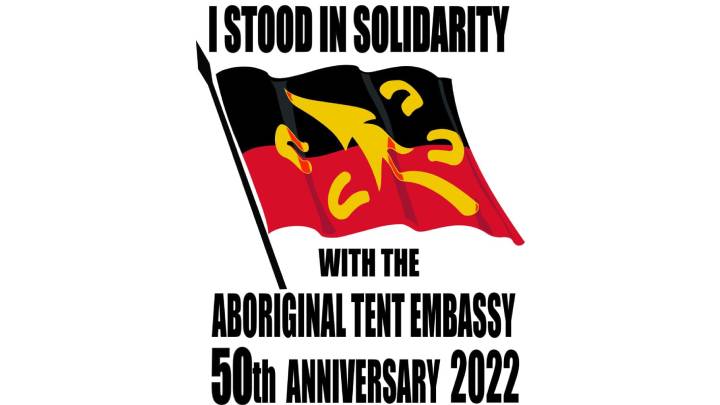
And lastly, Gwenda, what do you consider is going to be important moving forward from the 50th anniversary of the Embassy in terms of advancing the cause of the First Peoples of this continent?
It’s time for the United Nations to step in and come with us. They should stop working with government and start working with us – not with some Ken Wyatts or some little advisory groups.
Come to the Aboriginal Tent Embassy. Come and sit down with the people, because this needs to be discussed now and put out on the open table.
Unfortunately, we’re all being attacked here. And this is a time for the United Nations and government to come to the table.
Australia needs to start looking at its genocide.


